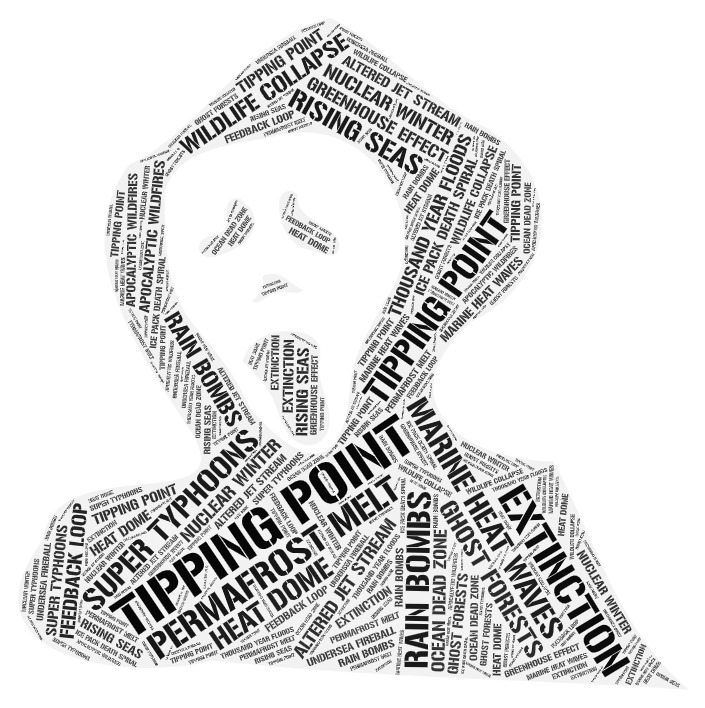A Story to Identify Your Climate Grief and Put it to Work
I want to tell you a little story about me and my relationship to the climate crisis and a phrase called climate grief. The story is a hard one to tell, but I have a reason for telling it to you.
It’s a familiar story with a classic arc. The protagonist, (that’s me), is in denial: scene after scene, year after year, moment after moment shows her running from the truth. She’s smart, aware, sensitive, even. If it wasn’t so sad, it’d be funny. The truth she’s avoiding is first named “global warming,” then “climate change,” then “climate crisis,” or “climate emergency.”
How did she manage to avoid dealing with the sadness and grief of our climate crisis? And why?
But first, a few horrible new words. Will you read them?
- Tipping Point (ugh!)
- Marine heat waves
- Permafrost melt
- Rain bombs
- Thousand year floods
- Apocalyptic wildfires
- Super typhoon
- Altered jet stream
- Wildlife collapse
- Ghost forests
- Heat domes
- Rising seas
- Extinction events
- Bomb cyclone
- Tipping Point (listed 2x for emphasis)
- Irreversible
- Feedback loops
- Greenhouse effect
- Ocean dead zones
- Nuclear winter; ice pack
- Death spirals
- Atmospheric river storms
- Undersea fireballs
Make it through the list? Congratulations. You’re hanging in there. Better than I did. The words don’t begin to convey the awfulness of what’s happening right before our eyes. And fast. And that’s just the weather systems and events. How all that catastrophic weather affects people, wildlife, countries, and resources is more than we can bear to imagine. Still, there are words for those horrors, too. They’re all happening now.
So how did our protagonist — me — avoid dealing with the horrible sadness of our situation? She developed a special talent. I knew exactly what I was doing, but I did it to protect myself from the pain. After all, “they” solved the ozone depletion problem, didn’t they? I turned off the radio when stories about climate change were reported. Easy enough. “PANEL ISSUES BLEAK REPORT ON CLIMATE CHANGE” was a headline headed for the recycle bin in 2007. Conversation turning to the subject of climate? Casually suggest a change, “Hey, let’s take a walk.”
I watched myself with fascination. I carefully, cleverly avoided dealing with the truth of our shared disaster. I was a character in a book whose big reckoning hadn’t come yet. I had sympathy for her. After all, she/I was raising two kids and trying to imagine a beautiful future for them. Who wants to think about wildfire poisoned air when the kids are young and their lungs vulnerable? Well, I didn’t. I planted a flower garden instead.
“Denial is the deliberate, often psychologically motivated, neglect of information that would be too upsetting or anxiety-provoking to allow into one’s belief system,” according to Paul Applebaum, former head of the American Psychiatric Association. I didn’t deny the science of climate change. I denied dealing with it emotionally. I was a good citizen, I told myself. I recycle, I ate red meats (a big contributor to climate change), I have profound respect for nature. I support California League of Conservation Voters who vote for candidates who promise to wean us off fossil fuels. I put solar panels on my roof. I look and act like a person who is doing their part. I thought that the world’s leaders, “they,” would do something. I thought that the Intergovernmental Panel on Climate Change would make a difference. It’s not up to me, is it?
Time passed. “Global warming” was now “Climate Crisis.” The “environmental crisis” became the human “existential crisis.” My garden needed more water from the hose now. Drought was real. Trees died. Did all that denial heavy lifting work for me? Well, I don’t know. For a while, I suppose.
Until one day I was walking in my neighborhood and saw a flyer that mentioned “climate grief.” My heart sank. There was a name for it. And other people had it too. This was terrible news. But somehow the name made it a little better. The floodgates of mourning opened and my journey began.
Well it’s many years since I put a name to my dread, my grief. The kids are sort of grown now. The flowers died when water rationing was implemented. My garden is drought tolerant these days.
The tipping point? It’s at our door. During the pandemic, when the only relief was a walk in nature, record setting wildfires near me in Los Angeles imprisoned us in our homes for days. The apocalypse was here. I deal with my climate grief every day. But now I turn it towards action. When An Inconvenient Truth came to theaters in 2007, I didn’t go see it. Now I am a Climate Reality leader trained by Al Gore. I regret that I didn’t take action when the kids were young, but each day I do things to help move forward the changes we need to avert the unimaginable. I write letters to elected officials. Everyday. I go to demonstrations. I call elected officials’ offices. I write the president. I learn and use the tools at my disposal. As a business, we are decarbonizing as fast as we can. I am attempting to lead others to decarbonize their homes and business. Why? Because there’s no time left. Our house is on fire.
Do you have climate grief? Put it to work with me. Do something. Get in touch if you’re a business looking to decarbonize. Leave a message and your contact information on our form, here. Let’s go.
They say the best time to plant trees was twenty years ago. The second best time is now. Climate? There’s no time to waste.
Here are 3 resources to get started:
SOLAR IS A BIG DEDUCTION IN YOUR CARBON EMISSIONS. WHY NOT START HERE?
CITY OF LA GREEN BUILDING COUNCIL RESOURCES
A GREAT RESOURCE TO LEARN ABOUT THE CLIMATE CRISIS IS AL GORE’S CLIMATE REALITY ORG





0 Comments